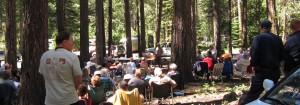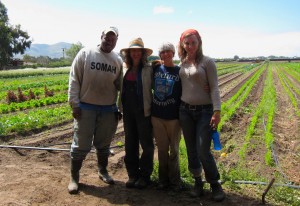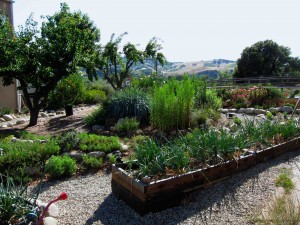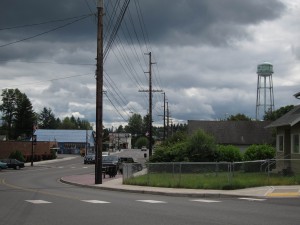08 Aug, 2011
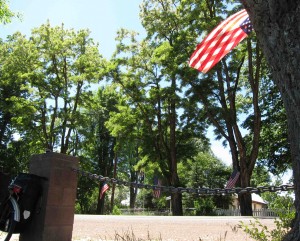 As I turn my handlebars east, it is important that I take some time to reflect upon the Christian responses to climate change I have observed thus far on the trip. This task requires a wide brush whose strokes will undoubtedly pass over details of individuals and particular communities. While I hope to honor the countless conversations and interactions that have flooded my waking moments on this trip, I recognize that there are several sweet voices that will go unheard. Still, I invite you to hum along.
As I turn my handlebars east, it is important that I take some time to reflect upon the Christian responses to climate change I have observed thus far on the trip. This task requires a wide brush whose strokes will undoubtedly pass over details of individuals and particular communities. While I hope to honor the countless conversations and interactions that have flooded my waking moments on this trip, I recognize that there are several sweet voices that will go unheard. Still, I invite you to hum along.
In over 2,000 miles, I’ve engaged in dialogue with communities that vary wildly with respect to size, denominational affiliation, and level of active response to climate change. From those communities, I’ve observed the following trends.
SUB-CULTURE OF INDIVIDUAL ACTION
In many of the communities I visited, there were a handful of individuals who care so passionately about climate change that their daily practices and occupations reflect their concern. Those practices varied from concerns around food and transportation to active investigation of the ways in which the changing conditions will disproportionately affect the poor and marginalized. I saw countless gardens, which ranged in size and depth from elaborately fenced master gardens with honeybees to a few tomatoes on the back porch. I saw vehicles ranging from electric cars to cargo bikes. But all of these practices and possessions point to a subculture of individuals who care passionately about the planet and see their actions and concern as deeply tied to their faith. Many of these individuals are so concerned about the effects of climate change on others that they have altered their careers, lifestyles, and relationships in order to illustrate their concern. In every case, the change in lifestyle enriched the lives of those who risked the change and had positive effects on other aspects of their lives.
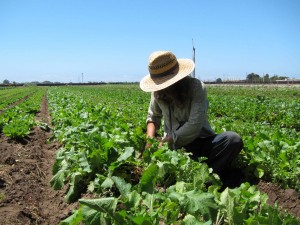
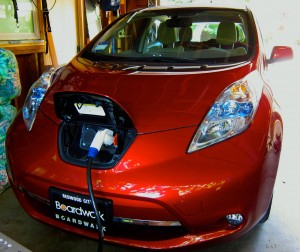
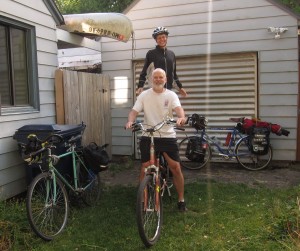 COMMUNITIES INTEGRATING AWARENESS IN PRACTICES
COMMUNITIES INTEGRATING AWARENESS IN PRACTICES
Although generally less pronounced than individual responses, Christian communities on the West Coast are responding to climate change in a variety of ways. There are a few organizations—such as Abundant Table and Earth Witness—that consider responding to climate change as a core aspect of their existence. In other communities, the emphasis on responding to climate change is peripheral. However, it is important to note the specific forms of response. In many churches, there is a shift in liturgy that expresses awareness of environmental degradation. Those liturgical acts range from regular prayers and gestures like the pouring of water to occasional services dedicated to awareness of human effects on the planet. In other churches, the emphasis is on gaining awareness through the condition of buildings, etc. This response tends to fall along the lines of installing solar panels, participating in green audits, and various building revisions. Some communities focus on transportation by creating competitions to minimize carbon emissions.
It is worth noting that most changes in liturgy or church buildings are directed at promoting general environmental awareness rather than specific responses to climate change.
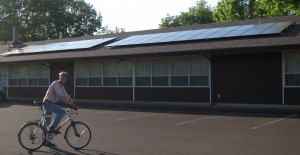
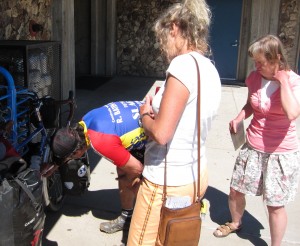 ECO-ANXIETY
ECO-ANXIETY
One unexpected but common way in which Christians on the West Coast are reacting to climate change is with intense eco-anxiety. These Christians are not merely aware of how our warming and changing climate will affect our planet; they are debilitated by the grandeur of the problem. They have no idea how to respond to climate change, and they are so intimidated that they do very little.
In light of this reaction, it is clear that there is a need for pastoral responses to climate change. I have yet to hear of communities that have offered a means for communities to voice their fears about climate change, but there is certainly a need. Going forward, this will be an important factor for Christian communities to consider—not only to empower action but also to promote general spiritual and mental health.
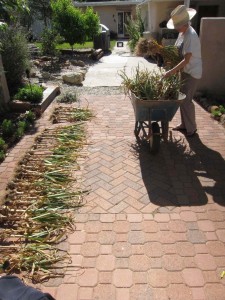
Mindful behavior combating eco-anxiety in simple ways. Anxiety-free Elaine Enns does some restorative harvesting of garlic at home in Southern California.
UNEXPECTED OPENNESS TO DIALOGUE
Another aspect that I did not anticipate is the openness to dialogue among groups that traditionally oppose Christian environmental concern. In small group settings, I found that conservative congregations were willing to discuss the relationship between love of God and neighbor and climate change. Those groups engaged in dialogue that was just as heartfelt as those of the discussions I had with liberal communities.
It is important to note a few common aspects of dialogue I had with groups that traditionally oppose talk around climate change. First, most communities have heard of climate change. The subject is not new. Second, the groups with whom I met did not think concern for the planet was opposed to their eschatology (notions regarding end times). Rather, those communities simply didn’t see environmental concern as something important for Christians. It wasn’t a priority. That is, they weren’t opposed to it. They simply did not know why they should care. The reaction prior to our dialogue was indifference—not rejection.
LACK OF URGENCY
Outside of the sub-culture of active individuals, I witnessed a general lack of urgency in the responses of the majority of Christian communities with whom I met. Almost every community understood the importance of climate change before I arrived. Many could articulate how environmental concern related to their Christian faith. However, nearly every community response had no sense of urgency specific to climate change.
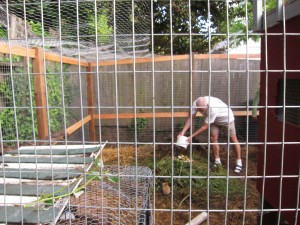 In response to what I have observed, I have a few QUESTIONS:
In response to what I have observed, I have a few QUESTIONS:
To what extent do the practices we see represent love of God and neighbor in action? Is the Christian response to climate change proportionate to the grandeur of the problem?
How does lack of awareness about our daily practices—such as driving or energy consumption—affect our ability to love God and our neighbors? How does mindfulness relate to both Christian charity and the changing climate? How does mindfulness relate to action and creativity?
What are churches doing to respond to anxiety about climate change?
How does the theology of a community affect its response to climate change? Is it appropriate to speak of a dominant theology in a community of individuals?
How does Christian response vary from non-Christian? Does that matter? What are the implications of this comparison?
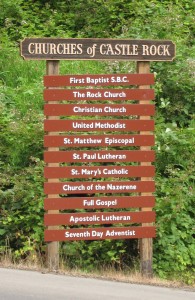
"They'll know we are Christians by our"...fractured church and abundance of buildings? Church listings in the town of Castle Rock, WA--population 1,892.
There is an old Christian hymn that suggests, “They’ll know we are Christians by our love.” If that is the case, then the dynamic sub-culture I have witnessed appears to be responding to climate change in the most “Christian” fashion. It has been argued that Christianity—and perhaps any religion or belief system—is inherently counter-cultural. Love is not a societal norm. But it is both the inspiration and the practice at the heart of Christianity. How do we show that love in the face of a changing climate?
Until we meet again
more identifiable by our love
than by anything that causes harm.


